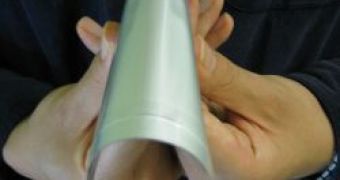Engineers from the Japanese company NEC have developed a flexible battery that is thinner than one millimeter (0, 33 mm) and can be recharged in 30 seconds. NEC claims that the battery was developed for use in applications like RFID cards (Radio Frequency Identifications) and could offer enough energy so that cards could work for several weeks without recharging.
The new device is an "organic radical battery", a technology developed by NEC that uses eco friendly materials in comparison with the chemical substances found in regular rechargeable batteries. According to NEC representatives, they began the development in this field in 2000.
Such thin batteries are important for the RFID active-type cards. The majority of these cards are passive devices that are not capable of sending data by themselves, working only when they are in the range of a radio field, meaning to work in a range of a few centimeters. The active tags are more likely miniature radios that can send data over large distances, so they can be read without needing to be brought close to a reader.
This is not the first type of such a battery. NEC also presented at the beginning of the year a larger version, proposing it as an emergency energy source for personal computers. Such a battery can sustain a PC for about 15 seconds, enough time to backup the data and to turn it off.

 14 DAY TRIAL //
14 DAY TRIAL //